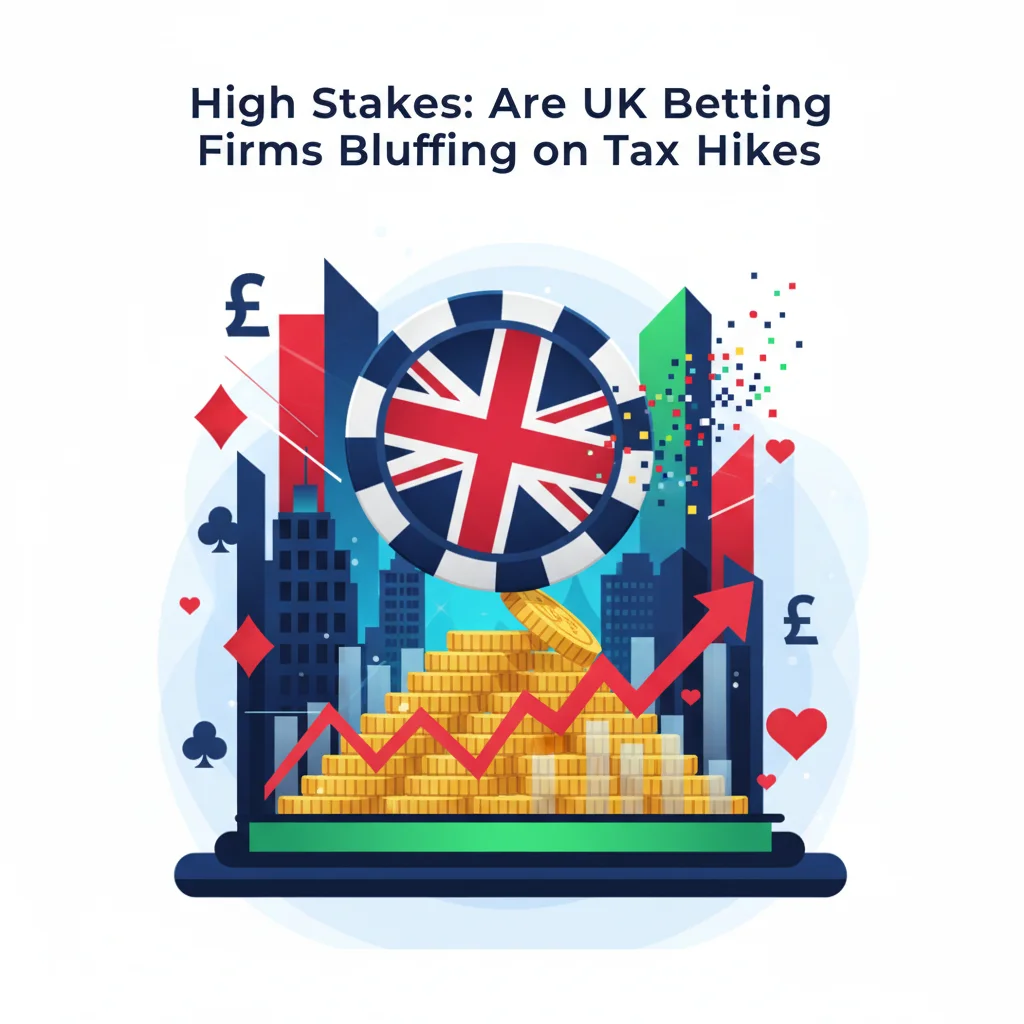
High Stakes: Are UK Betting Firms Bluffing on Tax Hikes?
In the high-stakes world of finance and politics, few battles are as publicly fraught as those over corporate taxation. A new frontline has just been drawn in the United Kingdom, where the multi-billion-pound online betting industry is locking horns with Parliament over the prospect of a tax increase. Shadow Chancellor Rachel Reeves recently signaled that a future Labour government could raise taxes on online bets, a move that has sent ripples through the stock market and prompted a fierce response from industry leaders. However, a cross-party group of MPs has publicly accused these firms of “scaremongering,” suggesting their dire predictions are more of a strategic bluff than an economic certainty. According to the BBC, this escalating war of words sets the stage for a significant policy showdown with far-reaching implications for the UK economy, investors, and the future of financial technology in the gambling sector.
This blog post will delve deep into this complex issue, moving beyond the headlines to analyze the financial, economic, and political forces at play. We will dissect the arguments from both sides, examine the potential impact on the stock market and the broader economy, and explore how this debate reflects a larger global trend of governments grappling with how to tax the digital economy.
The Political Ante: Why Target Online Betting?
The suggestion of a tax hike on online gambling is not arbitrary; it’s a calculated political and fiscal move. For any government, particularly one facing significant public spending pressures, the gambling industry represents a lucrative source of potential revenue. The UK’s gambling sector is a financial powerhouse, with the online segment, in particular, experiencing explosive growth, accelerated by advancements in financial technology and mobile accessibility.
The Gross Gambling Yield (GGY) for the online sector in the UK for the fiscal year April 2022 to March 2023 was a staggering £6.4 billion, according to the UK Gambling Commission. This massive figure makes it an obvious target for chancellors looking to bolster the nation’s coffers. The political calculus is also compelling. The gambling industry often faces public scrutiny over social issues like addiction, making a tax increase a politically popular measure that can be framed as both fiscally responsible and socially conscious. The funds raised could be earmarked for public services like the NHS or for funding addiction treatment and research, creating a powerful narrative that is difficult for opponents to counter.
The current tax on online betting companies’ profits (Gross Gambling Yield) is 21%. The debate centers on whether this figure adequately reflects the industry’s profitability and its societal impact, especially when compared to traditional brick-and-mortar betting shops, which face different cost structures and levies.
The Industry’s Hand: Are a Black Market and Economic Ruin Inevitable?
Faced with the threat of higher taxes, the betting industry has deployed a classic defensive strategy, warning of severe unintended consequences. Their primary arguments, which MPs have labeled “scaremongering,” revolve around two central fears:
- The Rise of the Black Market: The industry’s most potent argument is that excessive taxation will drive customers away from licensed, regulated UK operators and towards the unregulated, illegal black market. The Betting and Gaming Council (BGC) has consistently warned that this would not only decimate the UK’s regulated industry but also expose consumers to unscrupulous operators with no player protection, safer gambling tools, or connection to UK authorities. They argue that a thriving, regulated market is the best way to ensure player safety and maintain high standards.
- Economic Harm: The second pillar of their defense is the potential damage to the wider UK economy. Major betting firms are significant employers and contributors to the exchequer. Furthermore, they play a crucial role in funding other industries, most notably horse racing, through levies and media rights. The industry argues that a tax hike would reduce their ability to invest, sponsor, and support these ancillary sectors, potentially leading to job losses and a decline in related industries.
These arguments highlight the delicate balance regulators must strike. While the goal is to secure a fair tax contribution, pushing too hard could, in theory, undermine the very industry they seek to tax, leading to lower overall returns and increased social harm. The Damp Truth: How a Botched Green Initiative Reveals Deep Cracks in the Economy and Investment Strategy
The Investor’s View: Analyzing the Market Jitters
For those involved in investing and trading, this political maneuvering translates directly into market volatility. The UK is home to some of the world’s largest listed gambling companies, and their performance on the stock market is closely tied to regulatory sentiment. The mere suggestion of a tax hike can shave millions off their market capitalizations overnight.
Below is a table providing a snapshot of the major UK-listed betting and gaming giants, illustrating their significant scale within the global financial markets.
| Company | Prominent Brands | Market Capitalization (Approx. as of late 2023) | Key Business Focus |
|---|---|---|---|
| Flutter Entertainment (FLTR.L) | Paddy Power, Betfair, Sky Bet, FanDuel | ~£24 Billion | Global online sports betting and gaming, significant US presence |
| Entain plc (ENT.L) | Ladbrokes, Coral, bwin, BetMGM | ~£6 Billion | Global retail and online betting, strong joint venture in the US |
| 888 Holdings (888.L) | 888casino, 888poker, William Hill | ~£350 Million | Online casino, poker, and sports betting; recent acquisition of William Hill |
Note: Market capitalization figures are subject to market fluctuations. Data is aggregated from public financial reports and market data providers for illustrative purposes. For precise, up-to-the-minute data, investors should consult a financial data professional or their trading platform.
An increase in the tax rate directly impacts the bottom line, reducing net revenue and potentially leading to lower dividends and suppressed share price growth. Investors must now price in this “political risk” when evaluating these stocks. The key considerations from an investing perspective are:
- Margin Impact: How significantly would a 1%, 3%, or 5% tax increase erode profit margins?
- Geographic Diversification: Companies with a larger global footprint (like Flutter with its massive FanDuel operation in the US) are better insulated from UK-specific tax changes.
- Resilience and Pricing Power: Can these companies pass on some of the cost to consumers without losing market share? The highly competitive nature of the market makes this challenging.
The Billion-Pound Blunder: When Green Investments Create a Financial Nightmare
Fintech, Blockchain, and the Future of Betting
This tax debate is happening against a backdrop of immense technological change. The online betting industry is, at its core, a fintech industry. Its success is built on sophisticated platforms for real-time trading (of odds), secure digital wallets, instant payment processing, and complex data analytics for customer profiling and risk management. This advanced financial technology is what has enabled the sector’s explosive growth and profitability.
Looking ahead, technologies like blockchain are being discussed for their potential to bring transparency and fairness to online gaming, though adoption remains nascent. The core point is that this is a technology-driven sector. A higher tax burden could, as the industry argues, reduce the capital available for R&D and innovation, potentially stifling the very technological advancements that keep the UK market competitive and secure. For policymakers, this means the discussion is not just about taxing a bookmaker; it’s about the fiscal treatment of a cutting-edge digital industry.
This situation serves as a microcosm for a broader challenge facing governments worldwide: how to effectively tax a digital economy that is mobile, intangible, and constantly evolving. The principles of banking and finance are being reshaped by technology, and tax policy is struggling to keep pace. A Star in the Sky: How the Virgin Media O2-Starlink Deal Will Reshape the UK's Economy and Investment Landscape
Conclusion: Finding the Right Balance
The clash between UK politicians and betting firms is more than just a political spat; it’s a fundamental debate about the role of a controversial but economically significant industry in modern Britain. On one side is a legitimate need for public revenue and a desire to mitigate the social costs associated with gambling. On the other are powerful corporate interests warning of economic consequences and the dangers of an unregulated black market.
Investors and business leaders should watch this space not just for its direct impact on gambling stocks, but as a bellwether for the UK’s future approach to corporate and digital taxation. The final outcome will reveal much about the government’s priorities and its ability to strike a delicate balance between fiscal responsibility, economic pragmatism, and social welfare. Whether the industry’s warnings are a genuine red flag or a calculated bluff, the stakes in this game are incredibly high for everyone involved.


